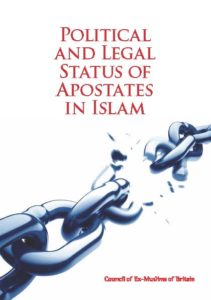 The Council of Ex-Muslims of Britain and Atheist Alliance International have just published a new report on the Political and Legal Status of Apostates in Islam with the support of The Richard Dawkins Foundation for Reason and Science UK.
The Council of Ex-Muslims of Britain and Atheist Alliance International have just published a new report on the Political and Legal Status of Apostates in Islam with the support of The Richard Dawkins Foundation for Reason and Science UK.
The report examines sources for laws that prohibit apostasy from Islam, reviews legislation and government policies in various countries that persecute apostates and blasphemers, and highlights the cases of some of the many persecuted individuals, with a focus on atheists, secularists and freethinkers.
You can read the report here: Apostasy_Report_Web.
@ Maryam
From the linked report:
Sadakat Kadri notes that there was little reason to leave Islam in the time of the prophet.
Islam was, after all, a winning ticket and very much under the personality cult of Mohammad. What really made apostasy such a big issue, was the lack of direction that immediately followed his death. Not only were there (pseudo) prophets trying to jump on the bandwagon, but there were many who thought the show was over and started to resort to the old ways. Abu Bakr, who picked up the reins/lash of power, realised what was happening, and suddenly apostasy became a major issue. Without murdering people back into line, the whole Islamic enterprise might have unraveled right there and then.
This religion, like any other, was woven wholly from socio-political yarn. That the inventions of the koran and the hadith were later selected to flesh out an evolving narrative, should come as no surprise. Clarity will not come from a regard of the holy books, but a sober look at the social and political pressures the early Muslim community was facing. Apostacy was a notion of such critical importance to Abu Bakr’s political power, that any number of sura and hadith could be made to appear, with utmost veracity, out of the woodwork.